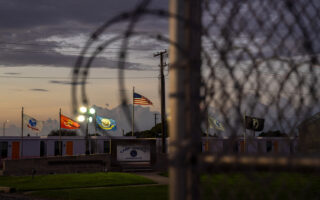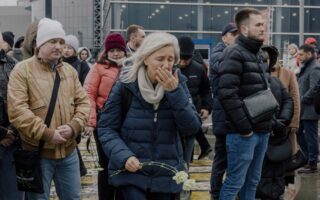Accused Sept 11 plotters agree to plead guilty at Guantanamo Bay

The man accused of plotting the attacks of Sept. 11 and two of his accomplices have agreed to plead guilty to conspiracy and murder charges in exchange for a life sentence rather than a death-penalty trial at Guantanamo Bay, Cuba, prosecutors said Wednesday.
Prosecutors said the deal was meant to bring some “finality and justice” to the case, particularly for the families of nearly 3,000 people who were killed in the attacks in New York City, at the Pentagon and in a Pennsylvania field.
The defendants Khalid Sheikh Mohammed, Walid bin Attash and Mustafa al-Hawsawi reached the deal in talks with prosecutors across 27 months at Guantánamo and approved Wednesday by a senior Pentagon official overseeing the war court.
The men have been in US custody since 2003. But the case had become mired in more than a decade of pretrial proceedings that focused on the question of whether their torture in secret CIA prisons had contaminated the evidence against them.
Word of the deal emerged in a letter from war court prosecutors to Sept. 11 family members.
“In exchange for the removal of the death penalty as a possible punishment, these three accused have agreed to plead guilty to all of the charged offenses, including the murder of the 2,976 people listed in the charge sheet,” said the letter, which was signed by Rear Adm. Aaron C. Rugh, the chief prosecutor for military commissions and three lawyers on his team.
The letter said the men could submit their pleas in open court as early as next week.
The plea averted what was envisioned as an eventual 12- to 18-month trial, or, alternatively, the possibility of the military judge throwing out confessions that were key to the government’s case. Col. Matthew N. McCall, the judge, had been hearing testimony this week and had more hearings scheduled for later this year to decide that and other key pretrial issues.
Mohammed, 59, a US-educated engineer and avowed jihadist, was accused of coming up with the idea of hijacking airplanes and flying them into buildings. Prosecutors said he presented Osama bin Laden with the plan in 1996, and then helped train and direct some of the hijackers.
He and Hawsawi, 55, were captured together in Pakistan in March 2003, and held in secret CIA prisons until their transfer to the US naval base at Guantanamo in September 2006 for an eventual trial. By then, interrogators had held them for years incommunicado and tortured them, including subjecting Mohammed to 183 rounds of waterboarding, a decision that would stymie years of efforts to put the men on trial.
Bin Attash, who is in his mid-40s, had been described as another deputy in the plot who had helped train some of the hijackers and had carried out missions tasked to him by both Mohammed and bin Laden.
The three men will still face a mini trial of sorts, but probably not before next year. At the military commissions, where they were charged, a judge accepts the plea, but a military jury must be empaneled to hear evidence, including testimony from victims of the attacks, and deliver a sentence. By that point, the judge has typically resolved litigation over what evidence can be used at the sentencing proceeding.
The deal stirred both anger and relief among the thousands of relatives of those killed Sept. 11.
Some family members had been fearful that the case would never reach a resolution, and that the defendants would die in US custody without a conviction. Others, wanting a death penalty, had pushed the government to get the case to trial, even at the risk of the sentence being later overturned.
Kathleen Vigiano, whose New York Police detective husband, Joseph Vigiano, and firefighter brother-in-law, John, were both killed at the World Trade Center, said she was “mostly angry” at the results.
“I really did want the death penalty,” she said. “They did kill 3,000 Americans and people are still dying from post-9/11 cancer.”
She added that she was concerned that the prisoners might someday be released; on the other hand, she said, if they remained in prison, the government would have to support them for life.
Glenn Morgan, whose father, Richard Morgan, was killed in the collapse of the World Trade Center, said he respected the prosecutors, who “put aside a desired capital sentence and made the best of the worst possible situation.”
“In doing so, they beat time,” he said. “In doing so, they applied the rule of law and found the wretched murderers of my father and his colleagues guilty.”
Rugh said in his letter that, as part of the deal, Mohammed and the others had agreed to answer questions from victims’ family members “regarding their roles and reasons for conducting the Sept. 11 attacks.”
Under the process, sometimes known as restorative justice, the family members would submit questions by Sept. 14, and should receive answers by the end of 2024. Mohammed’s lawyer, Gary D. Sowards, noted that having Mohammed answer “all questions of how and why 9/11 occurred” was an important portion of the agreement.
“The many people whose lives were tragically touched by these events will have the finality that so many have sought for so long,” Sowards said. “Equally important, the government has agreed to our commitment to allow victims and survivors to tell the stories of how 9/11 so greatly affected their lives.”
Two of the original five defendants were not a party to the deal. Ramzi Binalshibh, who was accused of helping to organize a cell of the hijackers in Hamburg, Germany, was found incompetent to stand trial because of mental illness, and his case was severed.
The fifth defendant, known as Ammar al-Baluchi, 46, also was not included in the plea agreement and could face trial alone. He is the nephew of Mohammed and is charged, like Hawsawi, with helping the hijackers with finances and travel arrangements while working in the Persian Gulf.
Plea deals had been under discussion since March 2022 but hit a significant snag in September when the White House declined to sign off on conditions sought by the defendants.
The men wanted assurances that they would not serve their sentences in solitary confinement, would have improved contact with their families and continued contact with their lawyers. Baluchi in particular also wanted the United States to pledge to set up a special, civilian-run torture treatment program for them at the prison.
The Biden administration considered the request for more than a year and then declined to sign off. It was not known if any of those conditions were contained in the agreement approved by Susan Escallier, the senior Pentagon official responsible for overseeing the war court.
The development came in the midst of the 51st round of pretrial hearings in the case since arraignment in 2012. Mohammed and the others were last seen in court almost two weeks ago, for testimony from a psychologist who had interrogated him and other CIA prisoners.
Rugh and his colleagues wrote in their letter to the families that their decision to agree to guilty pleas after “12 years of pretrial litigation was not reached lightly. However, it is our collective, reasoned and good-faith judgment that this resolution is the best path to finality and justice in this case.”
It was also signed by Clayton G. Trivett Jr. and Jeffrey D. Groharing, two military prosecutors who had been on the case since the start.
This article originally appeared in The New York Times.






